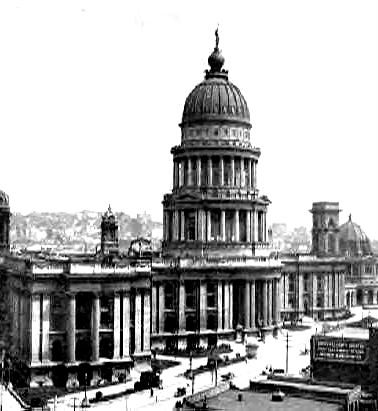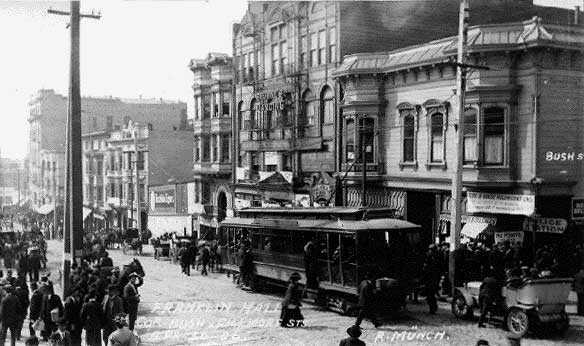|
"On the second day U.S. soldiers
were dispatched to every part of the city to keep peace
and order, to prevent looting, and to implement emergency
regulations set by the Mayor and the City Council
[Board of Supervisors]. On our street alone two soldiers
were assigned and they had our orders drawn up.
Among them were: Stop looting. Fire at robbers or looters."
"By the second night another order was added.
No lighted candles or matches in a building.
(If one wanted a light one had to go out on the streets.)
These rules were difficult to follow especially for families
with babies or little children. Sometime during that evening
Mother felt that she just had to have some warm milk for
my baby sister, Virginia, who was just six months old.
Cautiously Mother struck a match to light a Sterno.
Soon enough an officer knocked at our door and ordered her
to "Madam, put out the light and if you do that again I
have to shoot you.She protested only to be told that
such
was the order."
DeWitt C Baldwin
|
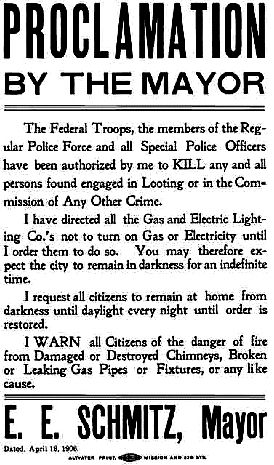 |
 |
"On the last day of the fire we had noticed an increased number of soldiers patrolling the streets, and we learned that they had been brought from army posts in Montana, Utah, and Wyoming, They brought their own tents and set them up in several locations throughout the city. There were no street lights, and no lights were permitted in houses. Sentries allowed no one to move about on the streets after dark, The city remained in very good order, however, and we heard no reports of violence or of looting. (In later years I have read reports of looting, but in my neighborhood we heard no such reports at the time.)"
Howard Livingston
|
"The bugle-calls in the morning, the pacing sentries and galloping officers, told of our military occupation. Two shots which I heard ended human lives. Both were cases of looting. Men who met that fate were frequently left to lie where they fell, and a sign of "Looter" put over them."
Emma M. Burke
|
"At 5 o�clock a rifle shot was heard on the block and some young fellow fell dead who was misprudent enough to venture out to borrow some whiskey for his sick mother. A soldier ordered him to throw it away and shot him for refusing. This is only one of many cases."
Fredrick H Collins
|
"Turning back I hurried up Sutter Street to find a militiaman guarding the entrance of my studio.
"You can't get in here," he said, handling his rifle in an unpleasant manner.
"But it's my home," I said.
"I don't care whether it is or not. Orders are to clear all houses in the block. If you don't do as I say, I shoot, see?"
There were rumors that some of the militia, drunk with liquor and power, had been shooting people."
Arnold Genthe
| 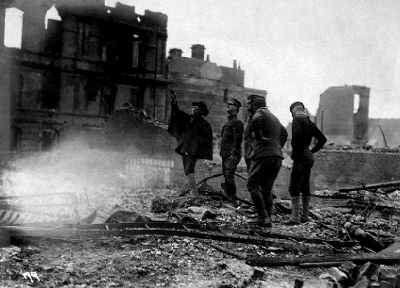
Artillery Officers inspecting some ruins |
Killing of Heber Tilden
Killing of Joseph Meyers
Death of an unknown man
Killing of Frank Riordan
|
"For a few days some wild press dispatches were sent out regarding the number of looters shot by the soldiers, but subsequent investigation fails to develop a single case of killing by an army trooper... the final reports show that two men were killed by State troops, under circumstances with which I am not familiar, and one man was apparently murdered by by a body of so-called "vigilantes"."
General Fredrick Funston |
"In order to get safely to the hospital I had a written pass
signed by the chief doctor stating that I was on the staff,
I also acquired a cap with a visor, above which I sewed a
cardboard red cross which I cut off a package at the hospital.
I was often stopped as I passed men working at removing rubble,
for those in charge of such jobs had the right to commandeer
any passing citizen. However my pass always got me through."
Dr. George Blumer
|
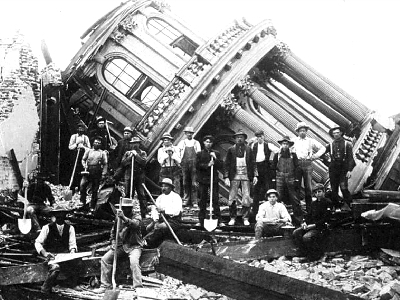 |




